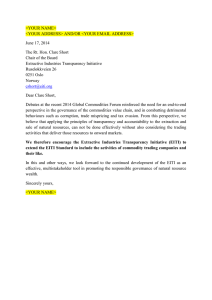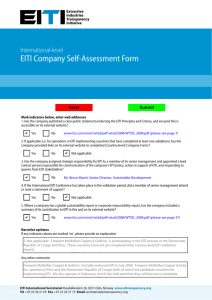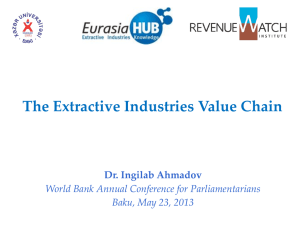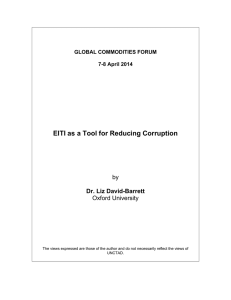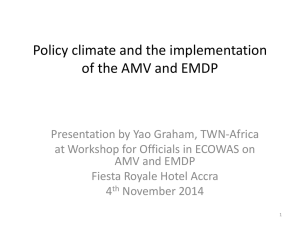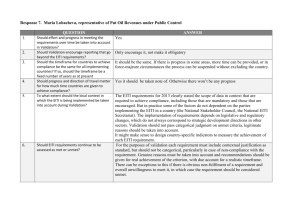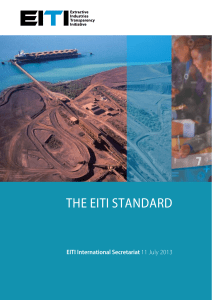THE ROLE OF EITI IN EXTRACTIVE SECTOR GOVERNANCE: THE PHILIPPINE EXPERIENCE
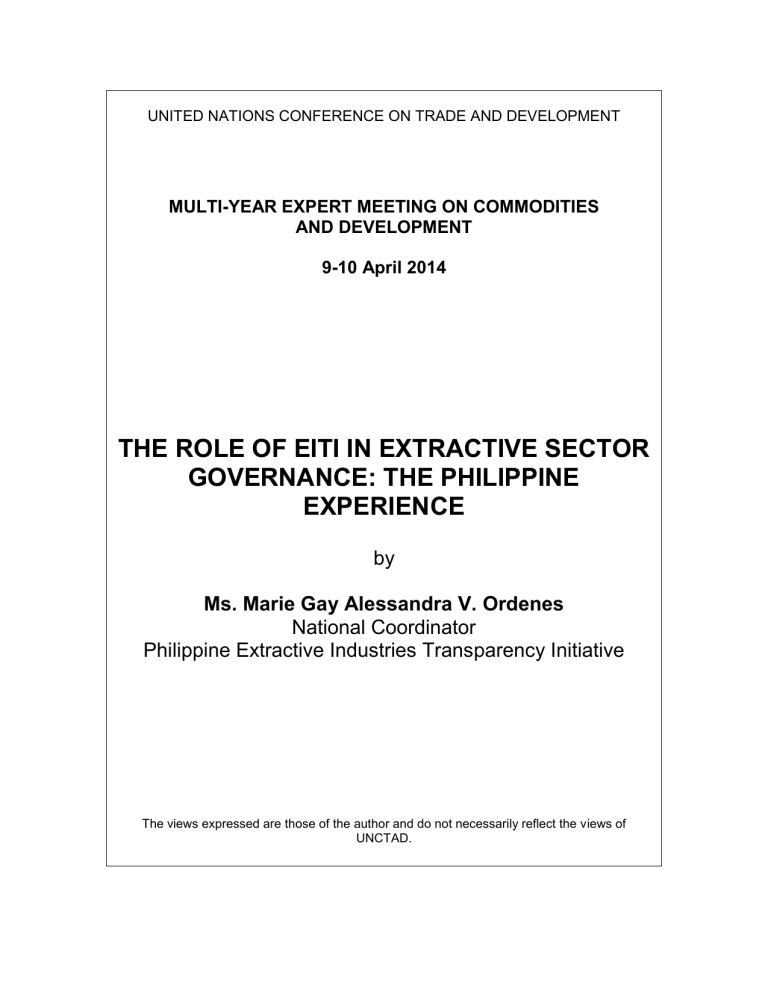
UNITED NATIONS CONFERENCE ON TRADE AND DEVELOPMENT
MULTI-YEAR EXPERT MEETING ON COMMODITIES
AND DEVELOPMENT
9-10 April 2014
THE ROLE OF EITI IN EXTRACTIVE SECTOR
GOVERNANCE: THE PHILIPPINE
EXPERIENCE by
Ms. Marie Gay Alessandra V. Ordenes
National Coordinator
Philippine Extractive Industries Transparency Initiative
The views expressed are those of the author and do not necessarily reflect the views of
UNCTAD.
THE ROLE OF EITI IN EXTRACTIVE SECTOR
GOVERNANCE: THE PHILIPPINE EXPERIENCE
Summary of Presentation
1. Overview of Mining Sector in the Philippines
2. The current mining fiscal regime
3. Some concerns about the current fiscal regime
1. The role of EITI and the Philippine context
1. Conclusion
OVERVIEW OF THE PHILIPPINE MINING
SECTOR
GROSS PRODUCTION VALUE: PHP74.2 BILLION
TOTAL MINING INESTMENT DATA: USD 782.7 MILLION
MINING CONTRIBUTION TO GDP: 0.6%
TOTAL EXPORTS OF MINERALS AND MINERAL PRODUCTS: USD2,673,000
MINING CONTRIBUTION TO TOTAL EMPLOYMENT: 0.7%
TAXES, FEES AND ROYALTIES FROM MINING (2012 DATA): PHP18,777.1
MILLION
OVERVIEW OF THE PHILIPPINE MINING
SECTOR
• The Philippines is a highly mineralized country with untapped mineral potential found in 30% of our land area
• Main minerals mined are gold, copper and nickel
• Reasons for low contribution to economy:
• Small-scale mines
• New mines that enjoy tax holidays
THE MINING FISCAL REGIME
• Mining regime depends on whether you are operating within a mineral reservation or not
• Also depends on whether you are operating under a MPSA or FTAA:
– MPSA: Basic mining payments
– FTAA: Basic payments plus additional government share of 50% of net mining revenue in excess of basic government share paid after the recovery period (i.e. when the net cash flows exceeds the pre-operating expenses)
THE MINING FISCAL REGIME
MAJOR TAXES AND FEES PAID TO NATIONAL GOVERNMENT :
CORPORATE INCOME TAX/MCIT
EXCISE TAX
ROYALTY
FEES PAID TO THE MINES AND GEOSCIENCES BUREAU
WITHHOLDING TAXES
ROYALTIES TO INDIGENOUS PEOPLES
GOVERNMENT SHARE UNDER FTAA
THE MINING FISCAL REGIME
MAJOR TAXES AND FEES PAID TO LOCAL GOVERNMENTS:
LOCAL BUSINESS TAX
REAL PROPERTY TAX
COMMUNITY TAX
RESIDENCE TAX
OCCUPATION FEES
REGISTRATION FEE
PERMIT FEE
OTHER LOCAL TAXES
THE MINING FISCAL REGIME
SOCIAL EXPENDITURES AND SPECIAL FUNDS:
Annual EPEP
Community Development Program
Social Development Management Program
Mine Rehabilitation Fund
Mine Waste and Tailings Reserve Fund
Final Mine Rehabilitation and Decommissioning Fund
Special Allowance payment to claim owners and surface right holders
AREAS OF CONCERN
1. GOVERNMENT SHARE
2. LOCAL PAYMENTS
3. SOCIAL EXPENDITURES
4. CONTRIBUTION TO ECONOMY
5. FRAGMENTED REGULATION
ONGOING REFORMS
1. EXECUTIVE ORDER NO. 79 INSTITUTIONALIZING
REFORMS IN THE MINING SECTOR
2. RATIONALIZATION OF MINING FISCAL REGIME
3. IMPLEMENTATION OF THE EXTRACTIVE
INDUSTRIES TRANSPARENCY INITIATIVE (EITI)
OVERVIEW OF EITI
EITI IMPLEMENTATION IN THE PHILIPPINES
1. ADMISSION AS A CANDIDATE COUNTRY: MAY 22, 2013
2. FORMATION OF A MULTI-STAKEHOLDER GROUP AND
REGULAR MEETINGS/CONSULTATIONS
3. FORMULATION OF OBJECTIVES FOR EITI
IMPLEMENTATION
4. SUBMISSION OF COUNTRY WORK PLAN TO THE EITI
BOARD
5. DATA GATHERING AND RECONCILIATION
EITI IMPLEMENTATION IN THE PHILIPPINES
PHILIPPINE EITI REPORT TO BE SUBMITTED TO THE EITI
INTERNATIONAL BOARD IN DECEMBER 2014
SCOPE OF THE REPORT:
LARGE-SCALE METALLIC MINING, OIL AND GAS
38 MINING COMPANIES, 11 OIL AND GAS COMPANIES
Role of EITI in improving EI governance in the Philippine Context
OBJECTIVES FOR EITI IMPLEMENTATION IN THE PHILIPPINES:
1. Show direct and indirect contribution of extractives to the economy (through
EITI process)
2. Increase public understanding of the management of natural resources and public accessibility of data
3. Strengthen national resource management / strengthen government systems
4. Create opportunities for dialogue and constructive engagement in natural resource management in order to build trust and reduce conflict among stakeholders
5. Strengthen business environment and increase investments
Role of EITI in improving EI governance in the Philippine Context
EITI engages government, business and civil society to examine the following together:
1. Fiscal regime
- Universe of payments
-Cost recoverable items
-Government share/Revenue sharing mechanism
Role of EITI in improving EI governance in the Philippine context
2. Legal and regulatory framework
• What are the laws and is there a need to amend them?
• Capacity of agencies to regulate
3. Local payments
• Scoping of local tax codes
Role of EITI in improving EI governance in the Philippine Context
4. Special Funds: Types, who manages, conditions for use, purpose
5. Gaps in data generation : Level of disaggregation, regularity, quality
6. Subnational transfers: Period, regularity, causes of delay
7. Transparency Issues: Accessibility of data, confidential information, contract disclosure, company waivers
Role of EITI in improving EI governance in the Philippine context
8. Financial tracking
-Collections of agencies from taxes and royalties that go to the national treasury, special funds, community projects, local units, etc.
-Payment mechanisms are illustrated
-Transfers from national government to local governments are tracked
-Role of SOEs are clarified
Role of EITI in improving EI governance in the Philippine context
EITI provides venue for industry to shed light on the following:
1. How much it actually pays to the government
2. How much it pays for social projects (mandatory and non-mandatory)
3. Compliance with licensing process
Role of EITI improving EI governance in the
Philippine context
EITI provides venue for CSOs to elevate their concerns regarding the following:
1. Fiscal policies
2. Adequacy of social expenditures and the need to align with local needs
3. Timeliness of subnational transfers
4. Transparency of information
5. Revenue management
Role of EITI in improving EI governance in the Philippine context
EITI enables the government to:
1. Examine current structures
2. Institutionalize reforms
3. Facilitate easier coordination among agencies
4. Provide adequate feedback mechanism
5. Have an evidence-based approach to policy making
CONCLUSION
EITI implementation in the Philippines provides a dynamic transparency mechanism that enables all sectors to engage in a sustained dialogue and examine together relevant issues surrounding the industry. An outcome of the process is the adoption of policies towards structural reforms.
THANK YOU!!!
PH - EITI Secretariat
Contact Details:
Email info@ph-eiti.com eitiphilippines@gmail.com
Telephone:+632 525 04 87
